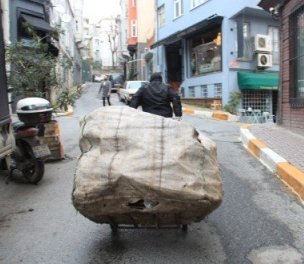Photo: İstanbul Recycling Workers Association (Banner reads "To live is to resist" in Turkish and Kurdish)
On May 10 at the Kıvılcım Cultural Center, a small venue squeezed between bars, clubs, and hotels in the Taksim district, İstanbul's Recycling Workers Association, an organization that advocates for waste pickers' rights, unveiled their roadmap in case the 'big one' hits, a tremblor with a magnitude of 7 or higher striking the metropolis in the nearby future.
Their announcement comes after the disastrous February 6 earthquakes affecting 11 provinces in the south and southeast of Turkey and northern parts of Syria, killing over 50,000 people and severely damaging or destroying over 227,000 buildings in Turkey alone, according to government figures.
"The days of national mobilization and solidarity that we experienced as a country in the early stages of the earthquake are now behind us. However, the pain and problems of earthquake victims continue," waste picker Mustafa Ay states with Ali Mendillioğlu, the President of the Recycling Workers Association, sitting alongside him.
Ay is one of the approximately 500,000 waste pickers, who roam around Turkey's urban centers with large plastic handcarts, scouring trash bins for valuable plastic, paper, and cardboard materials and selling them to unaccredited warehouses, which then trade the recyclable items to licensed firms. These warehouses also often double as shelters for the collectors.
Many of them come from marginalized communities, including internally displaced Kurdish farmers, members of the Roma community, and migrants—most work informally, with neither social security nor a salary. Meanwhile, recent regulatory attempts by the authorities have been ill-received, restricting their movement and only providing bare essentials such as gloves and carts.
Despite these challenges, they are a vital part of the waste collection process, contributing to about 80 percent of the country's recycling efforts.
Looming threat
Ay's public work for İstanbul is, however, carried out amidst a threat looming over all 15 million residents, a catastrophic earthquake that could havoc the city at any moment.
Such a tremblor could damage up to 500,000 buildings, with 86,000 collapsing completely or experiencing severe damage, İstanbul Planning Center (İPA) indicates. The recent tectonic shifts in the southeast has revoked this fear.
"All residents living in cities located on earthquake faults are once again faced with the reality of how unprepared and inadequate we are in many areas. For example, the problems with existing housing stock and logistics issues that will arise after the earthquake, such as the lack of earthquake assembly areas," Ay articulates.
Repurposing waste facilities
In case the 'big one' hits, the authorities have prepared designated earthquake assembly zones that typically can provide basic needs such as electricity and water and have space for tents or containers to be set up. However, the government has faced criticism in the last years for selling off these vacant lands in lucrative real estate deals.
Most of İstanbul's gathering points are now replaced by shopping malls or business centers. Out of the 470 designated areas, 300 are occupied by commercial buildings, the Union of Chambers of Turkish Engineers and Architects (TMMOB) stated in 2017.
With many spots now only able to harbor a few, İstanbul's Recycling Workers Association stepped up to adapt its warehouses into sanctuaries in the event of a disaster.
"We are starting initiatives to prepare a joint plan with all authorities, including municipalities and governorships. With a few minor modifications, thousands of waste collection depots established in open spaces in many neighborhoods of İstanbul can play a vital role as temporary settlement areas after a possible earthquake," Ay remarks, adding that the physical strength and collectiveness of the recycle workers can also be put to use.
A strong unbound collective
Ay highlights that most recycling workers are migrants who reside in the country without their families. As a result, they possess the ability to act collectively without having to prioritize their families in case of a potential earthquake.
Unfortunately, as these collectors frequently aren't citizens of Turkey they are repeatedly subject to raids. Not long ago, during the summer of 2021, at an informal waste facility in Bahçelievler, İstanbul, 241 individuals, predominantly from Afghanistan, were apprehended and transferred to a repatriation center.
Workers' blood
Besides providing refuge and human resources, the association also wants to register workers' blood groups, enabling them to quickly and accurately provide blood if necessary.
"We will register the blood types of all our collector friends residing in the depots in a computer system and try to support the patients in need of blood," the waste picker states, emphasizing that they are initiating the legal work with relevant institutions to make this happen.
Blood shortages have become an increasing public threat, due to controversies surrounding the Red Crescent's relief efforts after the February 6 earthquakes, including selling tents for reportedly 46 million lira (2.16 million Euros) to another relief organization, blood donations have decreased significantly, leading to critically low levels in Turkey's daily blood supply.
The country's current bloodstock supply stands at only half of the daily requirement of 50,000 units, according to Dr. Burak Kızanlık from the Red Crescent's Çapa Blood Donation Center and Dr. Güray Kılıç from the İstanbul Chamber of Physicians in a recent interview with bianet.
İstanbul's Recycling Workers Association ended its public statement with a call to prevent poverty and its effects, including death and fear, urging for organized action that produces solutions and empowers the poor to fight together for a better future. (WM)





.jpg)
_(1).jpg)
.jpg)

.jpg)
.jpg)
.jpg)
.jpg)
.jpg)